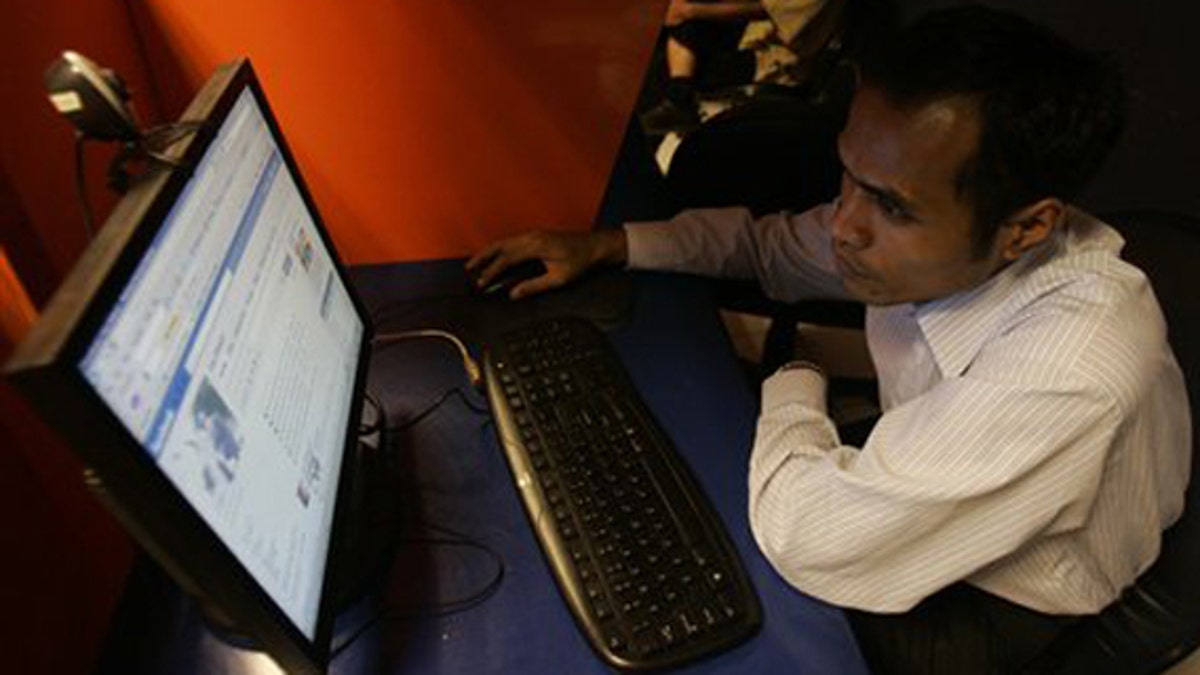
An Indonesian man checks his Facebook page at an Internet cafe in Jakarta, Indonesia, Wednesday, Feb. 17, 2010. A teenager received a suspended jail sentence for posting insulting comments on a romantic rival's Facebook page, the latest case bringing Indonesia's tough defamation laws under criticism. (AP Photo/Irwin Fedriansyah) (AP2010)
Colombia is a country that continues to fight the battles it has endured over the past several decades; a civil war, a war on drugs, and an endless war against corruption. One would think this would be more than enough for one nation to handle. But as it tries to fulfill its requirements for a stalled free trade agreement with the United States, the American government is demanding that the country crack down on a serious problem: internet piracy.
The downloading and distribution of online content like music, videogames and DVDs is widespread in this nation. It’s all too easy to hit the black market and pay less than $1 dollar per counterfeit movie. It’s much cheaper for the average Colombian who doesn’t make a high salary and can’t afford to pay $25 dollars for the real thing.
Now, with this U.S. “ultimatum” dumped in the Colombian congress’ lap, it has quickly responded by introducing the controversial Lleras Law, a piece of legislation that would force internet service providers (not the government) to monitor copyrighted internet content, spy on users, pull them offline, or even throw them in jail for a violation.
This terrifies some in the Colombian web community, leading them to question whether ISPs can make fair decisions about the freedom of expression and the limits to an author's rights. Still the government must do something to deal with the issue. But with the specifics of the law still not clearly defined, many public officials are scared that it could be abused. “It’s a big game of words from the government, says Senator Camilo Romero, someone who has been at the forefront of this debate since it began.
“Originally, the Internet was created as something where individuals felt free and could create a new democratic world. But now we’re witnessing a disruption from ‘the owners’ of the real world who also want to control the virtual world.” Romero understands that this legislation is vital to protect copyrighted material. But he believes that it’s even more important to preserve the freedoms of individual users.
And as it stands now, he thinks the Lleras Law goes against the rights of intimacy and privacy. Furthermore, allowing providers to act as ‘judges’ might be too risky, especially when the definition of an ISP is not even clear in the bill. In fact, there are so many grey areas within the legislation that the ministry of new technology has been petitioned to clarify all of its unclear terms and concepts.
"Copyrighted material” is a complex term in itself and is not limited to entertainment. That’s why many who work within the government are trying to educate everyday citizens about just how important this law is going to be. “If we create or support a law like this where the governments and ISPs have the power of block a user, it doesn’t mean that they are stopping a person just from downloading a movie,” says Manuel Tobar, a director for technology and Internet in the Colombian congress. “It also means that they are violating their rights to education, sharing information and getting informed.”
This is a vital point of view because the Internet has served as an effective tool to gather people around the world, in places like Egypt where mass online-organized protests led to the ouster of an abusive leader. “(The government) knows that it’s a tool to bring millions of people together who make decisions that affect politics.” What’s even more important in a place like Colombia is the presence of corruption. There’s concern that some politicians will have friends who own or work for the ISP and will convince them to block particular content that shows them in a negative light.
The new copyright law won’t only affect your everyday mp3 and video downloader. Vendors who sell DVDs on the streets may find themselves without a job. And with no legal right to distribute it, they’ll have to pack up shop and find another source of primary income.
“This would ruin my only job and way to make money,” says Henry Salvadores, a pirated movie vendor. “I have 2 children at home who I need to care for.” The legislation also puts the common Colombian web user in a comprising situation because there’s no real system in place to download media in a legal way. On programs like iTunes, you must type in your zip code as part of the billing address. And because postal codes don’t even exist in Colombia, the request fails. So there may be no alternatives.
Still, the debate rages on about who should be given control of monitoring anonymous men and women. “In a state of rights, someone has to decide why are we giving them the rights of a judge to a provider,” says Senator Romero. “So we want to put a question to the society: are you on the side of the government or are with you with the users who also have rights?”
David Noto is the Latin American correspondent for Fox News Radio in Bogotá, Colombia.
Follow us on twitter.com/foxnewslatino
Like us at facebook.com/foxnewslatino
